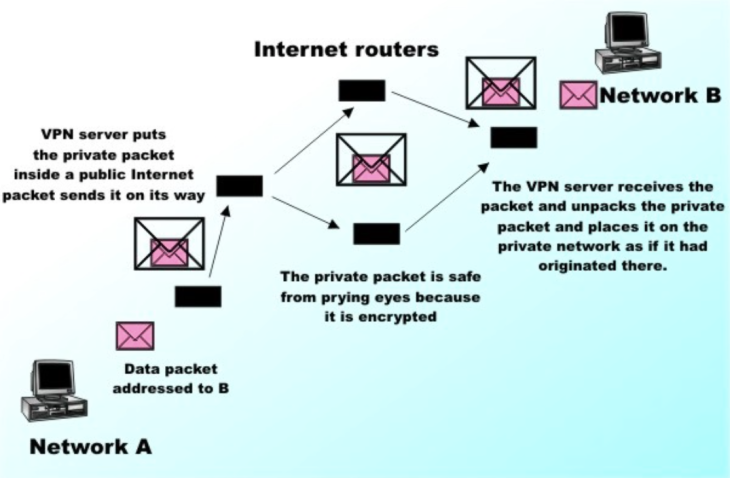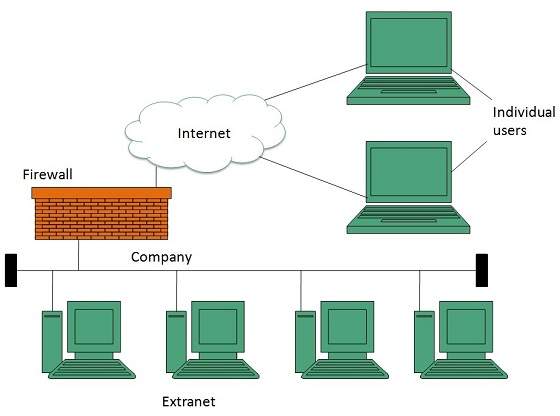VPN
VPN is a private network that uses a public network (usually the Internet) to connect remote sites or users together.
VPN has three features:
- Security: VPN protects data from being read or write by intruders since all information is encrypted.
- Data confidentiality: Information are encrypted
- Data authenticity: Users are required to use username and password to login
- Reliability refers to the consistent quality of connection between users.
- Scalability means that as the business grows, VPN service is easy to be extended.
VPN has many advantages as well. VPN is used for telecommuting. Telecommuting increases productivity of teleworkers. It reduces geographical restrictions by reducing travel times and traveling costs for remote users. VPN enables users to access to some banned websites. VPN is more secure than intranet as well.
VPN Tunnel
Tunneling is the process of encapsulating an entire data packet within another packet over its transmission. This technique ensure data confidentiality. When a router got attacked by hacker, VPN have technique to delete that tunnel and go the other way. The both ends of a tunnel is called tunnel interface. For example, client server like greenVPN is runner interface. (Phifer)

Common Types of VPNs


Site-to-Site VPNs connect the entire network with each user. For example, connecting branch officer to a company’s headquarters’ network. Hosts do not need a VPN client server. Information goes through a VPN gateway and got encrypted at senders’ VPN gateways. Then info go through the VPN tunnel and got decrypted at the seceivers’ VPN gateways. (How Vpns Work)
Remote-Access VPNs connect individual hosts to a private network. For example, connecting teleworkers to a company’ network over internet. Remote access VPNs need VPN client software, for example greenVPN, to encrypt information. There are two types of Remote-access VPN. The connection between teleworkers and the company’s private network is intranet-based. The connection between two companies’ networks is extranet-based. These two companies can access to their common extranet but not able to access to their separate intranets.(Phifer)

The difference between Intranet and Extranet (Extranet Overview)
VPN Technologies
- Secure VPN: all traffic on the VPN must be encrypted and be sent along virtual tunnels (cables).
- Trusted VPN: all traffic on the VPN relies on the network security of the provider’s network
- Hybrid VPN: the combination of secure and trusted technologies.
Some Related Key terms
VPN Appliances: computer, telephone
VPN Concentrators – hardware and software work together to establish VPN tunnels and handle large numbers of simultaneous connections
VPN-enabled Firewall – a firewall protecting traffic between networks with the added feature of managing traffic using specific VPN protocols.
Personal Reflection: After learning this lesson, I learned that VPN is not only for accessing banned websites, instead, it can ensure the data confidentiality of businesses. I also understand how traffic are sent through VPN network by tunneling.
Works Cited
Phifer, Lisa. “What Are The Differences Between A Site-To-Site VPN And A VPN Client Connecting To A VPN Server?”. Searchnetworking, 2016, http://searchnetworking.techtarget.com/answer/What-are-the-differences-between-a-site-to-site-VPN-and-a-VPN-client-connecting-to-a-VPN-server-Wh.
“Extranet Overview”. Www.Tutorialspoint.Com, 2016, https://www.tutorialspoint.com/internet_technologies/extranet_overview.htm.
“How Vpns Work”. Howstuffworks, 2016, http://computer.howstuffworks.com/vpn4.htm.
